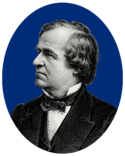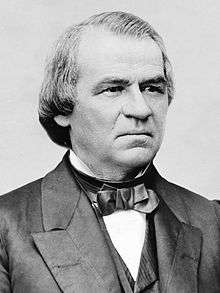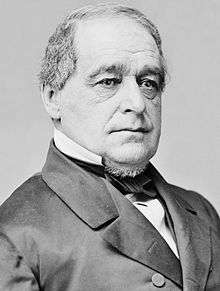1864 National Union National Convention
|
1864 presidential election | |
|
Nominees Lincoln and Johnson | |
| Convention | |
|---|---|
| Date(s) |
National Union June 7–8, 1864 |
| City | Baltimore, Maryland |
| Venue | Front Street Theatre |
| Candidates | |
| Presidential nominee | Abraham Lincoln of Illinois |
| Vice Presidential nominee | Andrew Johnson of Tennessee |
The 1864 National Union National Convention was the United States presidential nominating conventions of the National Union Party, which was a name adopted by the main faction of the Republican Party in a coalition with some War Democrats after Republicans nominated John Fremont over Lincoln.
Background
The party name was created in May 1864, during the American Civil War, ahead of the 1864 presidential election, in which President Abraham Lincoln, then a Republican, was running for reelection.
The Radical Republicans, a hard-line faction within Lincoln's own party, held the belief that Lincoln was incompetent and therefore could not be re-elected and had already formed a party called the Radical Democracy Party,[1] for which a few hundred delegates had convened in Cleveland, Ohio, on May 31, 1864. They eventually nominated John C. Frémont, who had been the Republicans' first presidential nominee during the 1856 election.
Republicans loyal to Lincoln created a new name for their party in convention at Baltimore, Maryland, during the first week in June 1864, in order to accommodate the War Democrats who supported the war and wished to separate themselves from the Copperheads. The convention dropped then-Vice President Hannibal Hamlin, a Radical Republican from the ticket, and chose War Democrat Andrew Johnson as Lincoln's running mate. The National Unionists hoped that the new party and the Lincoln-Johnson ticket would stress the national character of the war.
The party platform
...called for pursuit of the war until the Confederacy surrendered unconditionally; a constitutional amendment for the abolition of slavery; aid to disabled Union veterans; continued European neutrality; enforcement of the Monroe Doctrine; encouragement of immigration; and construction of a transcontinental railroad. It also praised the use of black troops and Lincoln's management of the war.[2]
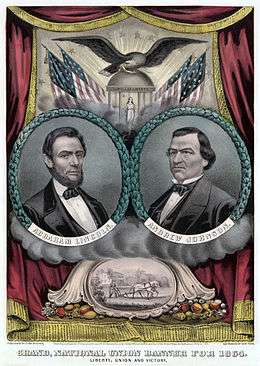
Presidential vote
On the first ballot, Missouri delegates cast their 22 votes for General Ulysses S. Grant. The Missourians quickly changed their votes to make Lincoln’s renomination unanimous.[1]
-

President Abraham Lincoln of Illinois
| Presidential Ballot | ||
| Ballot | 1st | 1st Revised |
|---|---|---|
| Abraham Lincoln | 494 | 516 |
| Ulysses S. Grant | 22 | 0 |
| Not Voting | 3 | 3 |
-

1st Presidential Ballot -

Revised 1st Presidential Ballot
The Vice presidential vote
Andrew Johnson, the former Senator from and current Military Governor of Tennessee, was named as Lincoln's running-mate. Others who were considered for the position, at one point or another, were former Senator Daniel Dickinson, Major General Benjamin Butler, Major General William Rosecrans, Joseph Holt, and former Treasury Secretary and Senator John Dix.
-
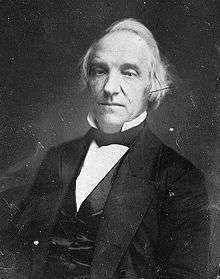
Hon.Daniel Dickinson of New York
-
 General Lovell Rousseau
General Lovell Rousseau
| Vice Presidential Ballot | ||
| Ballot | 1st | 1st Revised |
|---|---|---|
| Andrew Johnson | 200 | 492 |
| Hannibal Hamlin | 150 | 9 |
| Daniel S. Dickinson | 108 | 17 |
| Benjamin Butler | 28 | 0 |
| Lovell Rousseau | 21 | 0 |
| Schuyler Colfax | 6 | 0 |
| Ambrose Burnside | 2 | 0 |
| Joseph Holt | 2 | 0 |
| Preston King | 1 | 0 |
| David Tod | 1 | 1 |
-

1st Vice-Presidential Ballot -

Revised 1st Vice-Presidential Ballot
Lincoln's acceptance
In keeping with the tradition of the time, Lincoln did not attend the convention. On hearing the news of his re-nomination, he wrote on June 9, 1864:[3]
| “ | I am very grateful for the renewed confidence which has been accorded to me, both by the convention and by the National [Union] League. I am not insensible at all to the personal compliment there is in this; yet I do not allow myself to believe that any but a small portion of it is to be appropriated as a personal compliment. The convention and the nation, I am assured, are alike animated by a higher view of the interests of the country for the present and the great future, and that part I am entitled to appropriate as a compliment is only that part which I may lay hold of as being the opinion of the convention and of the League, that I am not entirely unworthy to be instructed with the place I have occupied for the last three years. I have not permitted myself, gentlemen, to conclude that I am the best man in the country; but I am reminded, in this connection, of a story of an old Dutch farmer, who remarked to a companion once that 'it was not best to swap horses when crossing streams.' | ” |
See also
References
- 1 2 "HarpWeek: Explore History - 1864: Lincoln v. McClellan". Retrieved 2010-05-31.
- ↑ "HarpWeek | Elections | 1864 Overview". Elections.harpweek.com. Retrieved 2013-10-12.
- ↑ Abraham Lincoln (June 27, 1864). "Letter Accepting the Presidential Nomination". Gerhard Peters and John T. Woolley, The American Presidency Project. Retrieved April 12, 2016.
External links
- Republican Party Platform of 1864 at The American Presidency Project
- Lincoln nomination acceptance letter at The American Presidency Project

